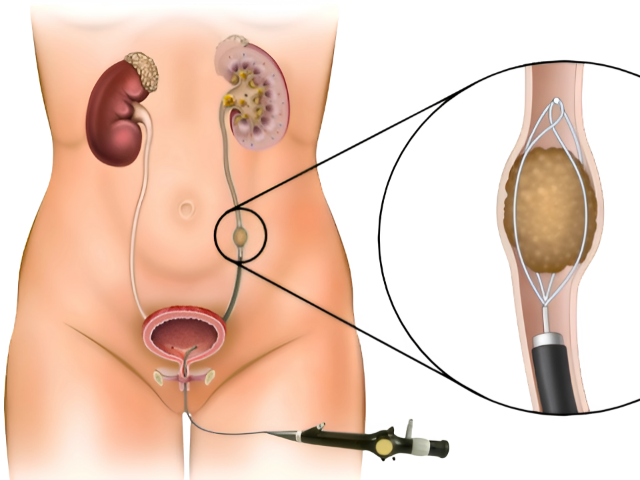Kidney stones can cause severe pain and urinary complications if left untreated. At KK Virat Hospital, we offer minimally invasive URSL surgery to safely and effectively remove kidney stones with zero external cuts and a quick recovery time. Our expert urologists in Karimnagar use precision laser technology for pain-free stone removal at affordable costs.
What is URSL Surgery?
Ureteroscopic Lithotripsy (URSL) is a minimally invasive laser procedure for treating kidney and ureteral stones that cannot pass naturally or do not respond to medication. A thin, flexible ureteroscope is inserted through the urethra to locate and remove the stone. Laser technology is used to break larger stones into smaller fragments, making it easier for the body to expel them.

Key Benefits of URSL Surgery
✔ No external cuts or incisions
✔ Minimally invasive with faster recovery
✔ Ideal for stones up to 10mm in size
✔ Daycare procedure – discharge within 24 hours
✔ Minimal complications with high success rates
Why is URSL Surgery Required?
URSL is recommended if you have:
- Severe pain that doesn’t improve with medications
- Kidney or ureteral stones larger than 7mm
- Frequent urinary tract infections (UTIs) caused by stones
- Obstruction of the urinary passage leading to urine retention
- Failed treatments with medications or home remedies
Who Needs URSL Surgery?
URSL is recommended for patients who experience:
- Persistent kidney stone symptoms lasting more than 2 weeks
- Severe pain, nausea, or vomiting due to ureteral blockage
- Failed attempts with medications or home remedies
- Kidney stones larger than 7mm that cannot pass naturally
- Recurrent urinary tract infections (UTIs) caused by stones
Symptoms Indicating the Need for URSL Surgery
If you experience any of these symptoms, consult a doctor immediately:
- Severe pain in the lower back, abdomen, or groin
- Blood in urine (hematuria)
- Painful urination or burning sensation
- Frequent or urgent urination
- Nausea and vomiting
- Fever and chills (indicating an infection)
Causes & Risk Factors for Kidney Stones
Kidney stones form due to an imbalance in minerals, salts, and water in urine. Common risk factors include:
- Dehydration – Low fluid intake increases stone formation
- High sodium intake – Leads to calcium-based stone deposits
- Excess protein consumption – Increases uric acid stone risk
- Obesity and sedentary lifestyle – Raises kidney stone risk
- Family history of kidney stones – Genetic predisposition
- Medical conditions – Hyperparathyroidism, diabetes, or gout
Kidney Stone Types Treated with URSL Surgery
There are four main types of kidney stones, and URSL is effective in treating all of them:
- Calcium Oxalate Stones – Most common type, formed due to high calcium & oxalate levels.
- Uric Acid Stones – Linked to high protein intake and dehydration.
- Struvite Stones – Form due to frequent urinary tract infections (UTIs).
- Cystine Stones – Rare, caused by a genetic disorder.
Pre-Surgery Diagnostic Tests for URSL
Before URSL surgery, the following tests help determine the size and location of stones:
🩺 Imaging Tests – X-rays, Ultrasound, MRI, or CT scan
🩸 Blood Tests – Creatinine, Urea, Electrolytes for kidney function assessment
💦 Urinalysis – To check for infection, blood, or crystals in urine
How is URSL Surgery Performed?
- Anesthesia Administration – The patient receives general or spinal anesthesia for a painless experience.
- Insertion of Ureteroscope – A thin, flexible scope is passed through the urethra and bladder into the ureter or kidney.
- Stone Location & Imaging – X-ray or fluoroscopy guidance helps pinpoint the stone’s exact position.
- Laser Lithotripsy (If Needed) – Large stones are fragmented using laser energy to allow easy removal.
- Stone Extraction – The stone is pulled out with a basket or flushed out through urine.
- Ureteral Stent Placement (If Needed) – A temporary stent is placed to help urine flow smoothly.
⏳ Duration – 30 to 45 minutes
🏥 Hospital Stay – Same-day discharge or 24-hour observation
What to Expect After URSL Surgery?
- Mild pain or discomfort in the lower abdomen (subsides in a few days)
- Blood in urine for 1-2 weeks (normal post-surgery)
- Slight burning sensation while urinating
- Temporary ureteral stent (if placed) removed after 5-7 days
- Resume daily activities within 3-5 days
Recovery & Post-Surgery Care
Follow these tips for a smooth recovery:
- Drink at least 3 liters of water daily to flush out stone fragments.
- Avoid caffeine, alcohol, and spicy foods for a week.
- Take prescribed antibiotics & painkillers as directed.
- Limit heavy lifting and strenuous activities for 1-2 weeks.
- Follow a kidney-friendly diet – Low sodium, oxalates, and sugar.
- Attend follow-up checkups to monitor progress and remove the ureteral stent if placed.
⏳ Full Recovery Time: 7-10 days
Advantages of URSL Surgery at KK Virat Hospital
- Expert Urologists – Highly experienced doctors with 15+ years of expertise.
- Latest Laser Technology – USFDA-approved laser lithotripsy system.
- Affordable & Transparent Pricing – Flexible payment options available.
- Insurance Assistance – Support with paperwork for easy claims.
- Comfortable Daycare Surgery – Discharge within 24 hours
- Follow-Up Consultations – Ensuring proper recovery
Preventing Kidney Stones After Surgery
To avoid recurrence of kidney stones, follow these precautionary measures:
- Increase Fluid Intake – Drink 3-4 liters of water daily
- Limit Salt & Processed Foods – Reduces calcium stone risk
- Eat More Citrus Fruits – Citrate helps prevent stone formation
- Control Protein Intake – Reduce red meat & high-purine foods
- Stay Active – Regular exercise prevents kidney stone formation
Why Choose URSL Surgery at KK Virat Super Speciality Hospital?
KK Virat Super Speciality Hospital in Karimnagar is the top choice for URSL Surgery, offering expert care and state-of-the-art medical facilities. With 15+ years of experienced urologists, we ensure precise and effective kidney stone removal.
We provide insurance support, flexible payment options, and a hassle-free experience with free pick-up and drop service on surgery day. Plus, our follow-up consultations ensure a smooth recovery.
Book Your Appointment Today
Seeking the best URSL Surgery in Karimnagar? Get in touch with our leading urologists today:
- Call Us Directly: Get in touch with our medical coordinators to schedule an appointment with an expert urologist.
- Direct Visit: You can visit our hospital directly by carrying your previous medical records if you have a medical history. However, admission will be based on the doctor’s recommendation.
What is the full form of URSL?
URSL stands for Ureteroscopic Lithotripsy. It is a minimally invasive procedure to remove ureteral and kidney stones using a ureteroscope and laser technology.
What size of stones are treated with the URSL procedure?
URSL is effective for small to medium-sized stones (7mm to 10mm) located in the ureter or kidney. For larger stones (above 10mm), additional procedures such as laser lithotripsy or PCNL may be needed.
What is the duration of URSL surgery?
The URSL procedure typically takes 30 to 45 minutes, depending on the size and location of the stone. The entire hospital stay, including preparation and post-surgery monitoring, is usually within 24 hours.
Is URSL surgery painful?
No, URSL is a painless procedure since it is performed under general or spinal anesthesia. Patients may experience mild discomfort or burning sensation while urinating for a few days post-surgery.
Does URSL have a high success rate?
Yes, URSL has a success rate of 85-95% for stones up to 10mm in size. The success rate may vary based on the stone’s hardness, location, and patient’s condition.
Is there insurance coverage for the URSL treatment in KK Virat Hospital, Karimnagar
Yes, most health insurance policies cover URSL surgery. At KK Virat Hospital, we assist with insurance claims and cashless hospitalization. Contact us to check your insurance eligibility.
What foods should I avoid for kidney stones?
Kidney stones cause pain in:
- Lower back or side (flank pain)
- Lower abdomen & groin
- Pain while urinating
What are the complications of untreated kidney stones?
Ignoring kidney stones can lead to serious complications, such as:
- Severe kidney infections (pyelonephritis)
- Obstruction in urine flow leading to kidney damage
- Recurrent urinary tract infections (UTIs)
- Blood in urine (hematuria)
Can kidney stones cause gastrointestinal problems?
Yes, kidney stones can lead to:
- Nausea and vomiting due to nerve connections between the kidneys and stomach
- Bloating and digestive discomfort
- Loss of appetite due to persistent pain
How long does it take to recover from URSL surgery?
Most patients recover within 3-5 days. However, complete healing may take up to 2 weeks, depending on stone size and overall health.
Will I need a stent after URSL?
A ureteral stent may be placed temporarily (5-7 days) to ensure smooth urine flow after surgery.
How soon can I return to work after URSL?
Patients can resume work within 3-5 days, provided there are no complications.
Can kidney stones recur after URSL?
Yes, kidney stones may recur if dietary and lifestyle changes are not followed. Drinking plenty of water and following a kidney-friendly diet can help prevent recurrence.
How can I prevent kidney stones after surgery?
- Stay hydrated – Drink 3-4 liters of water daily
- Limit oxalate-rich foods – Avoid spinach, nuts, and chocolate
- Reduce salt & sugar intake – Prevents calcium stone formation
- Eat more citrus fruits – Lemons & oranges help prevent stones
Is URSL safer than traditional kidney stone surgery?
Yes, URSL is much safer than open surgery because it is minimally invasive, involves no external cuts, and has a faster recovery time.
Can children undergo URSL surgery?
Yes, URSL is safe for children with kidney or ureteral stones, but the procedure is modified based on the child’s age and weight.
What are the side effects of URSL surgery?
While URSL is safe, some temporary side effects may include:
- Mild burning sensation while urinating
- Blood in urine for a few days
- Mild pain due to ureteral stent (if placed)
When should I consult a doctor after URSL?
Seek immediate medical attention if you experience:
- Severe pain that doesn’t subside with medications
- High fever & chills (signs of infection)
- Persistent blood in urine beyond 2 weeks


